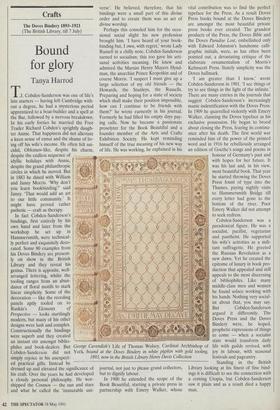Crafts
The Doves Bindery 1893-1921 (The British Library, till 7 July)
Bound for glory
Tanya Harrod
In fact Cobden-Sanderson's bindings, first • entirely by his own hand and later from the workshop he set up in Hammersmith, were technical- ly perfect and exquisitely deco- rated. Some 80 examples from his Doves Bindery are present- ly on show in the British Library and they reveal his genius. There is apposite, well- arranged lettering, whilst the tooling ranges from an abun- dance of floral motifs to stark linear simplicity. Some of the decoration — like the receding panels aptly tooled on to
Ruskin's Elements of Perspective — looks startlingly modern, but many of his other designs were lush and complex. Constructionally the bindings were superb and they created an instant stir amongst biblio- philes and book-dealers. But Cobden-Sanderson did not simply rejoice in his unexpect- ed practical gifts. Instead he dressed up and elevated the significance of his craft. Over the years he had developed a cloudy personal philosophy. He wor- shipped the Cosmos — the sun and stars and what he called the 'immutable uni-
verse'. He believed, therefore, that his bindings were a small part of this divine order and to create them was an act of divine worship.
Perhaps this consoled him for the occa- sional social slight his new profession brought him. 'I have heard of your book- binding but, I own, with regret,' wrote Lady Russell in a chilly note. Cobden-Sanderson turned to socialism; this too gave his arti- sanal activities meaning. He knew and admired the Marxist Henry Mayers Hynd- man, the anarchist Prince Kropotkin and of course Morris. 'I suspect I must give up a large selection of my old friends — the Howards, the Stanleys, the Russells. Preparing and hoping for a state of society which shall make their position impossible, how can I continue to be friends with them?' he wrote earnestly in his journal. Formerly he had filled his empty days pay- ing calls. Now he became a passionate proselyter for the Book Beautiful and a founder member of the Arts and Crafts Exhibition Society. He kept reminding himself of the true meaning of his new way of life. He was working, he explained in his
George Cavendish's Life of Thomas Wolsey, Cardinal Archbishop of York, bound at the Doves Bindery in white pigskin with gold tooling, 1893, now in the British Library Henry Davis Collection
journal, not just to please grand collectors, but to dignify labour.
In 1900 he extended the scope of the Book Beautiful, starting a private press in partnership with Emery Walker, whose
vital contribution was to find the perfect typeface for the Press. As a result Doves Press books bound at the Doves Bindery are amongst the most beautiful private press books ever created. The grandest products of the Press, the Doves Bible and the Doves Paradise Lost, embellished only with Edward Johnston's handsome calli- graphic initials, were, as has often been pointed out, a devastating critique of the elaborate ornamentalism of Morris's Kelmscott Press. Stately simplicity was the Doves hallmark.
`I am greater than I know,' wrote Cobden-Sanderson in 1901. 'I see things or try to see things in the light of the infinite.' There are many entries in the journals that suggest Cobden-Sanderson's increasingly manic indentification with the Doves Press. In 1909 he quarrelled violently with Emery Walker, claiming the Doves typeface as his exclusive possession. He began to brood about closing the Press, fearing its continu- ance after his death. The first world war reminded him of the power of the printed word and in 1916 he rebelliously arranged an edition of Goethe's songs and poems in honour of Germany's past and with hopes for her future. It was his last and, in his view, most beautiful book. That year he started throwing the Doves Press fount of type into the Thames, paying nightly visits to Hammersmith Bridge till every letter had gone to the bottom of the river. Poor Emery Walker did not attempt to seek redress.
Cobden-Sanderson was a paradoxical figure. He was a socialist, pacifist, vegetarian and pantheist. He supported his wife's activities as a mili- tant suffragette. He greeted the Russian Revolution as a new dawn. Yet he created the epitome of luxury in book pro- duction that appealed and still appeals to the most discerning of bibliophiles. Like many middle-class men and women he found solace working with his hands. Nothing very social- ist about that, you may say.
But Cobden-Sanderson argued it differently. The Doves Press and the Doves Bindery were, he hoped, prophetic expressions of things to come — when a socialist state would transform daily life with guilds revived, with joy in labour, with seasonal festivals and pageantry.
Standing in the British Library looking at his finest of fine bind- ings it is difficult to see the connection with a coming Utopia, but Cobden-Sanderson saw it plain and as a result died a happy man.


























































 Previous page
Previous page